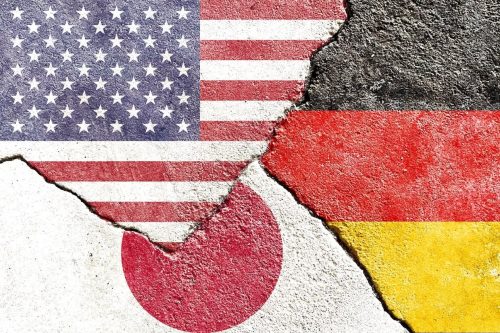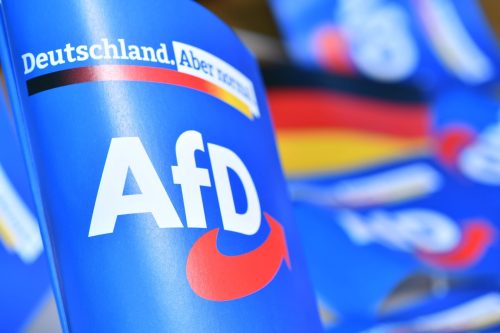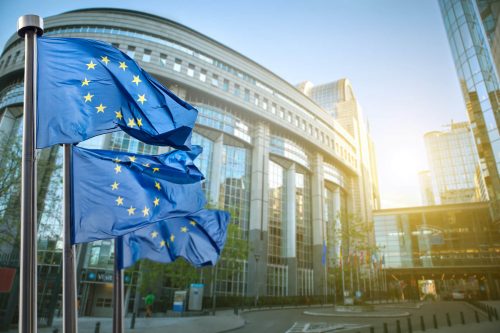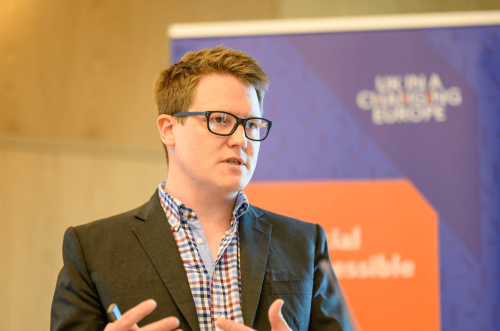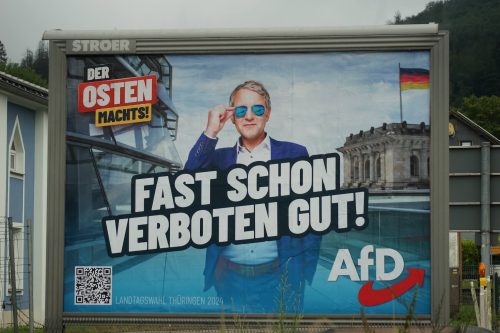Germany
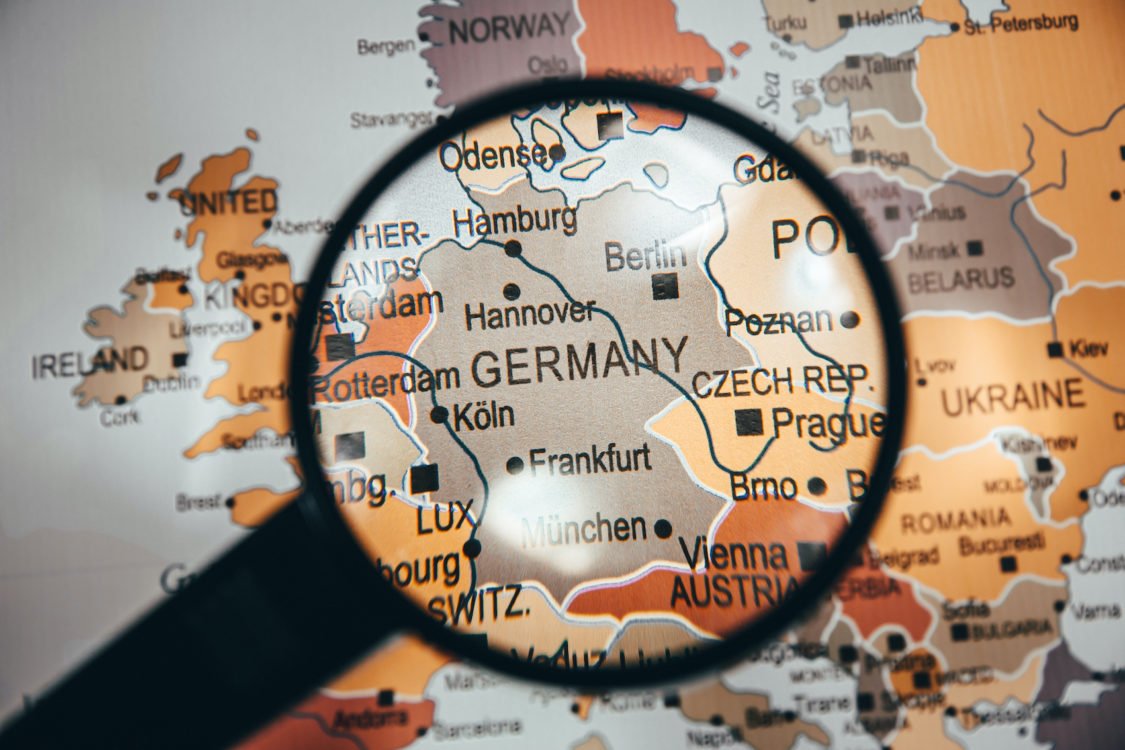
Almost 75 years after the dissolution of the German Reich, right-wing populism is once again attempting to unlock a viable political space in German politics. Alternative für Deutschland (AfD) today is seen in Germany as the greatest representative of a wide range right-wing populist agenda, including opposition to same-sex marriage, child adoption for same-sex couples, and the fight against climate change. The main ideological driver of the party, however, is a tough opposition to the government’s currency and migration policies.
Located in Central Europe, Germany, officially the Federal Republic of Germany, is a federal parliamentary republic and the leading economic power within the EU. Although the motto “Never Again” has been widely accepted in Germany since the fall of the Third Reich, the previous decade has seen the dangerous rise of far-right populists across Germany, led by the extremist Alternative for Germany (AfD). For the first time in 70 years, the far-right again has a foothold in Germany.
Germany’s advanced development – it is the economic and political heart of Europe – belies its troubled past. It played integral roles in the outbreaks of World War I and World War II. At the end of the first World War, widespread popular discontent triggered the German Revolution of 1918-19, replacing the monarchy with the Weimar Republic. Although it was largely marked by high unemployment, civil unrest, and rampant inflation, Germans enjoyed a period of relative stability from 1923 until the Nazi’s rise to power in 1933.
Given its painful experience with totalitarian governments, populism is by no means a new phenomenon in Germany. Although the Nazis were not a purely populist party as we understand it today, the party possessed many of the characteristics of populist political culture. Establishing “the Third Reich,” Hitler pledged to make Germany great again – a clear defiance of the Versailles Treaty that ruined the country’s economy. He made a constant racist appeal to the “superior,” golden-haired Aryan race. Hitler designed a functioning welfare state to reward loyal supporters, reduced mass unemployment via public works programs, significantly improved living standards of “true” Germans, and gradually brought all aspects of life under his control.
Hitler’s Germany was also characterized by a racist foreign policy defined by a simple, sinister belief: that Germanic peoples were the master race, and thus destined to establish a permanent rule in Eastern Europe and the Soviet Union (Christian Leitz, 2004: 11-12). To that end, the Nazis invaded Poland in 1939, driving Great Britain and France to declare war on Germany, marking the beginning of one of the most destructive conflicts in history. Until Germany’s defeat in 1945, the war killed 45-60 million people, including six million Jews who were murdered in Nazi concentration camps (Alan Taylor, 2011). With the end of the war, Germany was divided into the Federal Republic of Germany in the west and the communist German Democratic Republic in the east. The country remained divided until unification in 1990.
With unification, relatively underdeveloped eastern Germany began to benefit from western prosperity, while the country as a whole entered a stunningly peaceful period of integration with Europe. In 1995, it became the first EU member to abolish border controls as part of the Schengen Agreement.
Almost 75 years after the dissolution of the German Reich, right-wing populism is once again attempting to carve out a viable political space in German politics. Of the five populist political parties in the country today,[1] Alternative für Deutschland (AfD) has become the country’s largest opposition party. Founded in April 2013, the AfD started as a Eurosceptic and German nationalist-populist party. The AfD opposed Berlin-led bailouts of the countries of Southern Europe. Its initial election manifesto was therefore heavily focused on lambasting federal policies regarding the European debt crisis, as well as the Eurozone’s failure to become a stable currency area. According to AfD executives, southern European countries are impoverished and on the brink of insolvency because of the “competitive pressure of the Euro” (Lachmann, 2013).
In 2015, when Europe was hit by waves of migrants from the Middle East and North Africa, the AfD shifted its focus from economics to immigration. Nearly one million migrants, most of them from predominantly Muslim-majority countries, entered Germany from 2015 through mid-2016. This influx of refugees presented AfD politicians with an excellent opportunity to gin up anti-immigration sentiment in an effort to expand the party’s base. This bore fruits sooner than expected. The AfD first shocked the German political class in the 2017 federal election, securing 12.6 percent of the total votes, becoming the third-largest party in the country with a total of 94 seats in the Bundestag.
Today, this is seen as the greatest representative of a wide range of right-wing populist views, including opposition to same-sex marriage, child adoption for same-sex couples, and the fight against climate change. The main ideological driver of the party, however, remains opposition to Germany’s currency and migration policies that, according to Frauke Petry, former head of the party, are destroying European solidarity. Petry believes that Chancellor Angela Merkel “opened the country’s doors” to immigrants from Muslim countries and this will irreversibly change Germany’s culture (Beyer, Fleischhauer, 2016). The AfD’s current co-chair, Jörg Meuthen, has a similar stance regarding immigration to Germany. He believes immigration is one of the most fundamental reasons for his party’s existence and thus the key concern is getting this “chaos under control” (Deutsche Welle, 2018). In 2017, Meuthen called on the federal government to engage in “negative immigration” by deporting at least 200,000 more immigrants each year than it takes in (Martin, 2017).
Founded by the merger of the Party of Democratic Socialism (PDS) and Labour and Social Justice – The Electoral Alternative (WASG) in 2007, Die Linke (DL) is another populist party that recently gained a foothold in German politics. DL is a left-wing, socialist party with an emphasis on anti-capitalist and pro-Keynesian views. The party calls for increased government expenditures and lower taxes. Although often labeled as “the biggest of the small parties,” DL occupies a crucial place in German politics not because of its well-established electoral base, but mostly because of its potential to become a coalition partner with one of the two major political parties, the Social Democratic Party (SDP) (Deutsche Welle, 2017).
Though the ideological differences between the two parties are evident, SDP and DL politicians often work in harmony at the local level. At the national level, however, Katja Kipping, the co-chair of the DL, centers her rhetoric in direct appeals to the people, promoting a populist agenda that calls for a major redistribution of resources. Defining the DL as a social alternative to Chancellor Merkel, Kipping believes in a government that saves “everybody” from poverty, that advocates for climate justice as a civil rights issue and that pursues the politics of peace instead of raising defense spending. Perhaps unsurprisingly, she is also in favor of replacing NATO with a less-costly European collective security system: “We have to introduce a new policy of détente in the tradition of Willy Brandt” (Eaton, 2018). DL is home to politicians with even more utopic ideas that challenge the existing order. Some of its radical members advocate for the prohibition of weapons exports, withdrawal of all German soldiers from around the world, and a ban on gas and oil fracking. With 67 deputies in the Bundestag, the DL is currently the fifth largest party in Germany.
In terms of civil liberties, Germany ranks as a free country (Freedom House, 2019). A good record of civil liberties, human rights, and political opportunities is retained. The rule of law is a principle of governance and therefore is highly respected (Freedom House). Germans enjoy regular and competitive multiparty elections, which allows for the peaceful transfer of power between rival parties.
Yet, it should be noted that far-right violence in the country has become more prevalent following the 2015 migrant crisis. According to the country’s interior ministry, there are some 24,000 far-right extremists, over 12,000 of which are inclined to violence. In 2018 alone, German police recorded 19,105 far-right crimes, mostly against Muslims and Turkish people, the country’s largest ethnic minority, estimated to number up to four million people (Hurriyet Daily News, 2019). In the latest of the far-right attacks, nine people, almost all of the Turkish descent, were killed and five others wounded in a hookah bar in the city of Hanau, in February 2020 (Eddy, 2020). In June 2019, pro-migrant German politician Walter Lübcke was murdered by two Neo-Nazi assailants with a gunshot to the head. Lübcke was known for his advocacy for migrants.
Although right-wing extremism in Germany is nothing new, many believe that AfD plays a significant role in encouraging and enabling extremists to freely pursue violent and racist activities. “The AfD is the political arm of hate,” according to prominent Green Party politician Cem Ozdemir (McGuinness, 2020). Similarly, Mathias Middelberg, a Conservative Christian Democrat (CDU) politician, believes that AfD’s hardcore extremist sentiments contribute significantly to right-wing extremist violence in Germany (McGuinness).
As is, right-wing populists in the country still lack the potential to dominate mainstream politics. However, as the generations that witnessed the Holocaust pass, German collective guilt is increasingly becoming a thing of the past. The fact that bilateral and multilateral security issues are becoming more diverse, and issues like migration are being made part of the security apparatus, may pave the way for right-wing populism to achieve more political prominence in the future.
July 10, 2020.
References
— (2017). “Things to know about Germany’s Left party,” Deutsche Welle, August 9, 2017. https://www.dw.com/en/things-to-know-about-germanys-left-party/a-40013805 (accessed on June 25, 2020).
— (2018). “AfD’s Jörg Meuthen aims to bring together populists in European Parliament” Deutsche Welle, November 17, 2018. https://www.dw.com/en/afds-j%C3%B6rg-meuthen-aims-to-bring-together-populists-in-european-parliament/a-46341249 (accessed on June 24, 2020).
— (2019). Freedom House. “Freedom in the World 2019 Narrative Report for Germany,” https://freedomhouse.org/country/germany/freedom-world/2020 (accessed on June 24, 2020).
— (2019). “Turks in Germany demand action against racism,” Hurriyet Daily News, March 22 2019, https://www.hurriyetdailynews.com/turks-in-germany-demand-action-against-racism-142099 (accessed on June 26, 2020).
— (2020). “German far-right political scandal reflects the rise of Europe’s populists,” Deutsche Welle, February 6, 2020. https://www.dw.com/en/german-far-right-political-scandal-reflects-rise-of-europes-populists/a-52284670 (accessed on June 25, 2020).
Beyer, Susanne and Jan Fleischhauer (2016). “AfD Head Frauke Petry: The Immigration of Muslims Will Change Our Culture,” Spiegel International, March 30, 2016. https://www.spiegel.de/international/germany/interview-with-frauke-petry-of-the-alternative-for-germany-a-1084493.html(accessed on June 23, 2020).
Eaton, George. (2018). “German Left Party leader Katja Kipping: As a Marxist, you can never be dogmatic,” Newstatesman, October 3, 2018. https://www.newstatesman.com/world/2018/10/german-left-party-leader-katja-kipping-marxist-you-can-never-be-dogmatic (accessed on June 25, 2020).
Eddy, Melissa. (2020). “Far-Right Terrorism Is No. 1 Threat, Germany Is Told After Attack,” New York Times, February 21, 2020. https://www.nytimes.com/2020/02/21/world/europe/germany-shooting-terrorism.html (accessed on June 26, 2020).
Lachmann, Von Günther. (2013). “Anti-Euro-Partei geißelt die Politik der Kanzlerin,” Welt, March 3-2013.https://www.welt.de/politik/deutschland/article114091447/Anti-Euro-Partei-geisselt-die-Politik-der-Kanzlerin.html(accessed on June 25, 2020).
Leitz, Christian. (2004). Nazi Foreign Policy, 1933-1941: The Road to Global War Hardcover, (Routledge: London).
Martin, Michelle. (2017). “Germany’s AfD calls for ‘negative immigration’ of 200,000 people,” Reuters, March 9, 2017. https://www.reuters.com/article/us-germany-election-afd-idUSKBN16G2KZ (accessed on June 22, 2020).
McGuinness, Damien. (2020). “Hanau shooting: Why Germany’s far-right AfD is blamed over racist violence,” BBC News, February 22, 2020. https://www.bbc.com/news/world-europe-51588602 (accessed on June 20, 2020).
[1] These are: Alternative for Germany (Alternative für Deutschland, AfD); The National Democratic Party of Germany (Nationaldemokratische Partei Deutschlands or NPD; Die Marxistisch-Leninistische Partei Deutschlands (Kurzbezeichnung MLPD); The Republicans (Die Republikaner, REP); Die Deutsche Kommunistische Partei (DKP).




